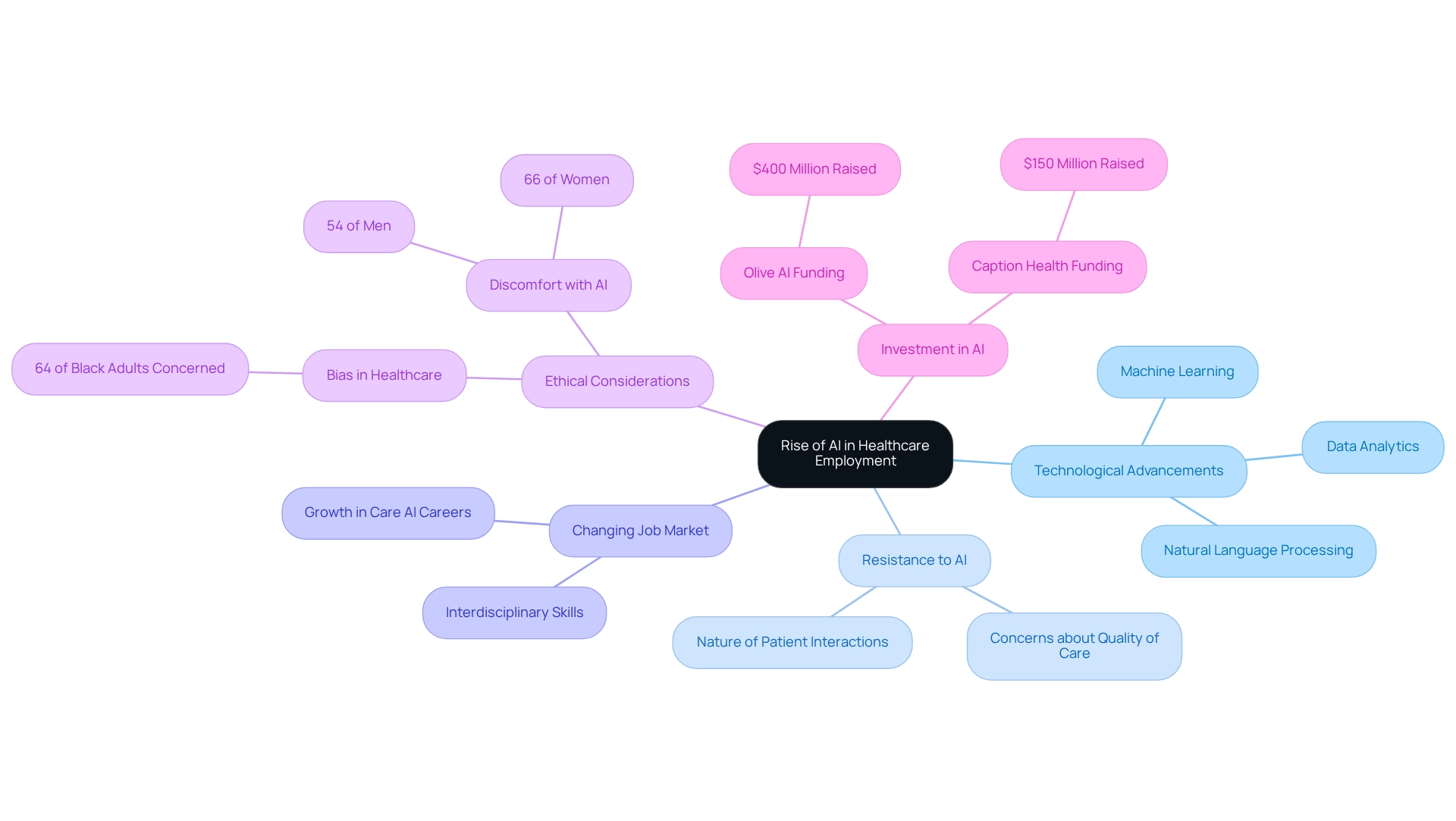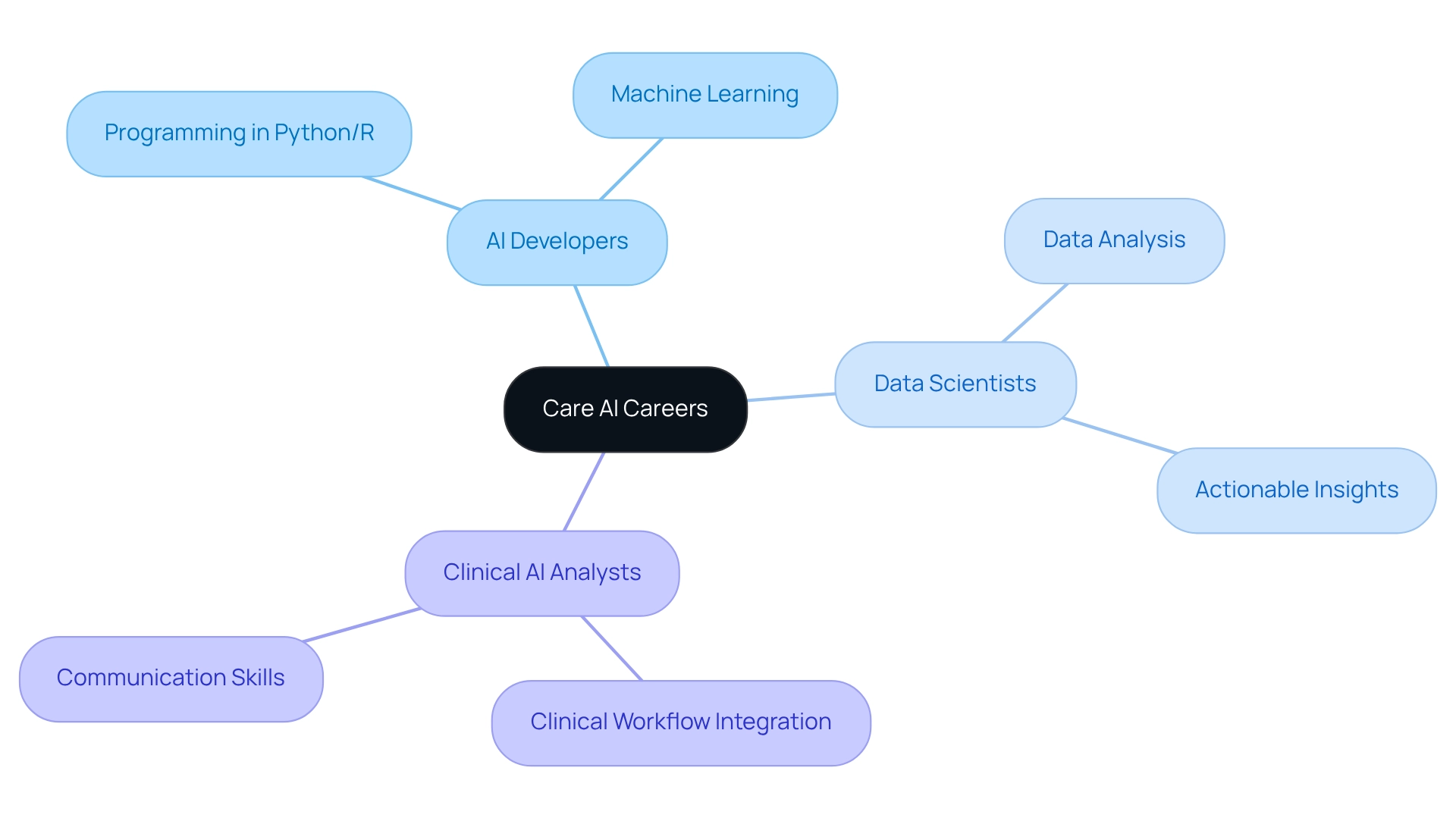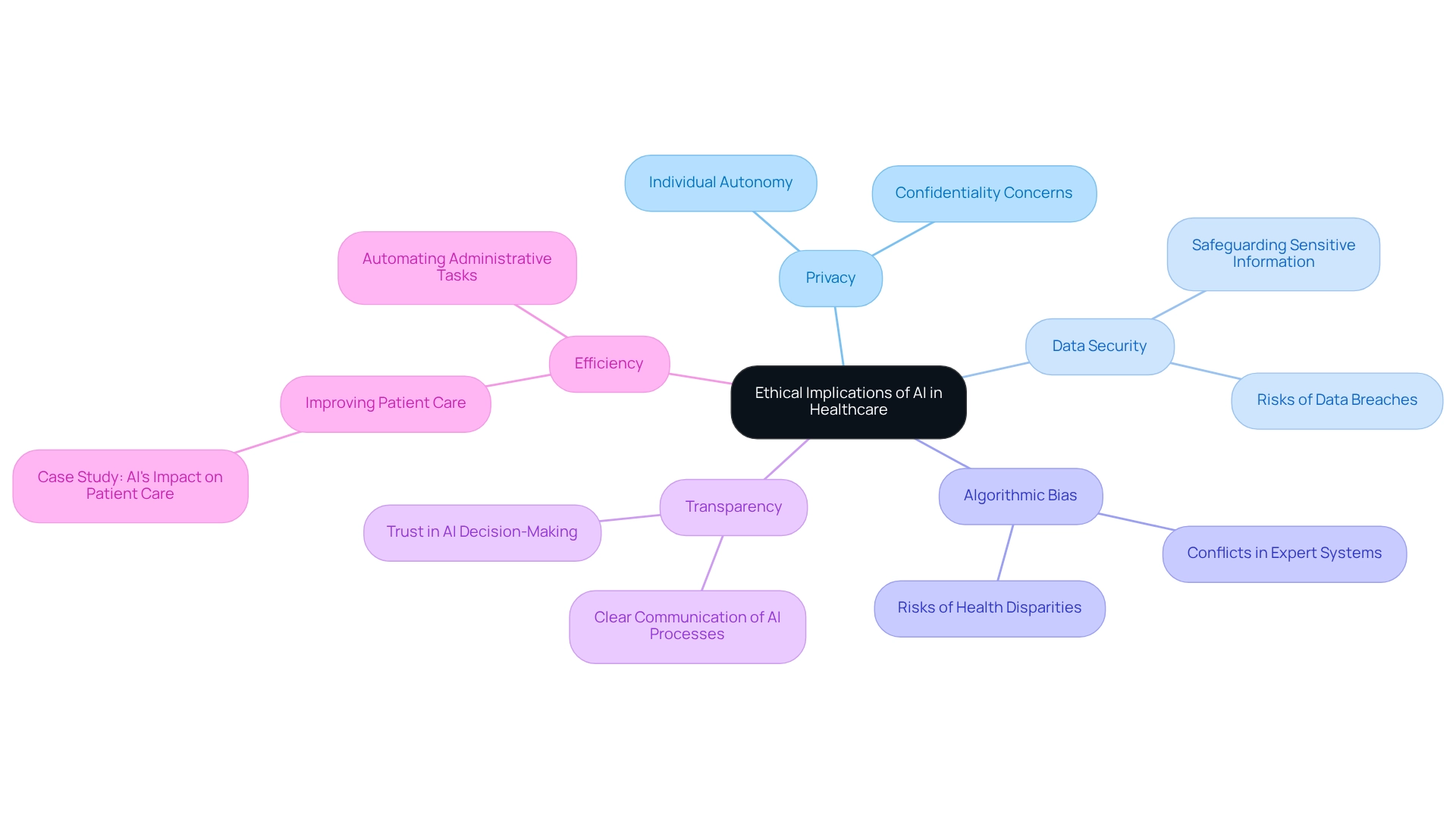Overview
In the evolving landscape of healthcare, Care AI careers present a range of roles, including AI developers, data scientists, and clinical analysts. These professionals harness the power of artificial intelligence to enhance healthcare delivery and improve patient outcomes. As we witness advancements in AI technologies, the demand for these compassionate experts grows.
However, it’s essential to recognize the ethical considerations that accompany these innovations. While AI brings remarkable opportunities for efficiency and deeper patient engagement, it also raises important ethical questions that we must thoughtfully address. This ensures that AI is integrated responsibly into our medical services, fostering a system that prioritizes patient well-being.
Introduction
As artificial intelligence continues to transform industries, its profound impact on healthcare is becoming increasingly evident. The emergence of Care AI careers is at the forefront of this change, offering a diverse array of roles that not only enhance patient outcomes but also alleviate the burdens on healthcare operations.
Have you considered how AI developers and ethical consultants are essential in navigating the complexities of integrating these innovative technologies into clinical settings? With the growing demand for skilled professionals in this field, the landscape of healthcare employment is evolving rapidly, presenting both exciting opportunities and significant challenges.
This article invites you to explore the burgeoning realm of Care AI careers, delving into the key roles, necessary skills, and ethical considerations that are shaping the future of healthcare.
Define Care AI Careers: An Overview
involve a range of professional roles that utilize artificial intelligence technologies to enhance service delivery and outcomes for individuals. Imagine the impact of AI developers, data scientists, clinical analysts, and advisory consultants, each playing a vital role in the seamless integration of AI within medical environments. These positions primarily focus on enhancing operational efficiency, fostering patient engagement, and ensuring ethical practices in AI applications.
As the healthcare sector increasingly embraces AI solutions, the demand for skilled professionals continues to rise. For instance, machine learning engineers have seen their average earnings increase by 15% each year from 2019 to 2024. This trend underscores the lucrative opportunities within this field and highlights the essential role these experts play in improving medical services. Moreover, AI specialists rank among the highest-compensated professionals globally, reflecting the growing need for expertise in this transformative area.
Recent trends indicate significant growth in AI job opportunities within medical services. Platforms like CourseCareers are empowering aspiring IT and tech professionals by equipping them with the necessary skills and certifications for entry-level positions in Care AI. While it’s true that AI has displaced approximately 3,900 jobs in the U.S. as of 2023, this shift also paves the way for new employment opportunities in care AI careers, highlighting the evolving landscape of the medical workforce. Ethical consultants are crucial in ensuring that AI practices align with the values upheld by organizations like CosmaNeura. By streamlining administrative tasks and enhancing clinical decision-making, the advancement of Care AI careers is instrumental in fostering a more efficient and ethically responsible medical landscape. Are you ready to explore how care AI careers can make a difference? Your journey towards contributing to a compassionate and innovative healthcare system starts here.
Contextualize the Rise of AI in Healthcare Employment
The rise of AI in medical employment is fundamentally linked to advancements in machine learning, data analytics, and natural language processing. Over the past decade, medical organizations have increasingly recognized AI's potential to optimize operations, lower expenses, and enhance patient care. Yet, a significant challenge remains: many healthcare providers, especially physicians, exhibit resistance to innovation. This reluctance often stems from concerns about preserving the quality of care and the nature of patient interactions. This resistance can hinder the adoption of AI solutions, which are essential for improving medical service delivery.
The COVID-19 pandemic has accelerated the acceptance of telehealth and AI-driven solutions, integrating these technologies into everyday medical practices. As a result, the job market in the medical field is evolving, with a growing emphasis on interdisciplinary skills that merge medical knowledge with technological expertise, especially in . Notably, as of December 2023, only 25% of medical executives had implemented generative AI solutions, revealing a substantial opportunity for growth in this sector.
Moreover, the ongoing conversation about AI's role in medicine is highlighted by the fact that 23% of individuals believe AI chatbots should be accessible to everyone, regardless of their current therapeutic engagement. This shift reflects changing attitudes toward AI and underscores the potential for job creation in care AI careers within this emerging field. Organizations are increasingly eager to harness AI's capabilities to enhance care delivery and operational efficiency.
Significant investments in AI medical solutions, such as Olive AI raising $400 million, further illustrate the growing importance and financial backing of AI technologies in healthcare. However, it is crucial to consider the ethical implications of AI in medical services. As Tajammul Pangarkar pointed out, 64% of Black adults in the United States view bias related to race or ethnicity as a significant issue in health and medicine. Additionally, statistics indicate that 54% of men and 66% of women express unease with AI in treatment and diagnosis by medical professionals. This highlights the necessity for a balanced approach to AI integration, one that considers both technological advancements and the ethical challenges they present.
How can we navigate these complexities together? By acknowledging the emotional challenges faced by healthcare providers and fostering a supportive environment, we can pave the way for a more compassionate integration of AI in medicine.

Explore Key Roles and Skills in Care AI Careers
In the evolving landscape of , key roles encompass a variety of functions that are vital for integrating AI technologies into medical services. Have you ever considered how AI developers create and execute algorithms that empower these capabilities? Meanwhile, data scientists diligently examine extensive volumes of medical data to derive actionable insights. Clinical AI analysts work closely with medical providers, ensuring that AI tools are seamlessly incorporated into clinical workflows. This collaboration is vital for improving care and addressing the challenges of fragmented service delivery.
The skills required for these roles are not just technical; they also demand a deep understanding of medical processes. Proficiency in programming languages like Python and R, alongside expertise in machine learning techniques and data analysis, is essential. This knowledge allows professionals to tailor AI solutions to meet specific clinical needs, ultimately enhancing diagnostic accuracy and alleviating physician stress. Additionally, soft skills such as communication, empathy, and ethical reasoning are increasingly important. These abilities enable professionals to navigate the complexities of care AI careers while effectively utilizing AI technologies. As we look to the future, the demand for AI developers in the medical sector continues to rise. This growth is fueled by the expanding incorporation of AI solutions across the industry. In 2023, a significant shift has occurred, with 40% of physicians expressing skepticism about AI's potential. This skepticism underscores the urgent need for skilled professionals who can bridge the gap between technology and patient care. How can we enhance the credibility of AI in medical settings, especially in faith-based environments supported by CosmaNeura?
Moreover, the increasing use of cloud computing platforms like AWS and Google Cloud is paving the way for implementing AI solutions. This trend suggests a notable shift towards cloud integration in medical applications. Continuous education and adaptability are essential in this rapidly changing field, where progress in AI and medicine demands ongoing skill enhancement. Interestingly, 78% of users reported a clearer understanding of their lab results when using AI-driven explanations. This finding highlights the positive impact of AI on healthcare and emphasizes the importance of moral reasoning and communication skills in AI roles.
As we navigate these changes together, let’s consider how we can support one another in this journey towards a more efficient and compassionate healthcare system.

Examine Ethical Implications of AI in Healthcare
The incorporation of AI in medical services brings forth significant ethical considerations, especially concerning individual privacy, data security, and algorithmic bias. As medical providers increasingly embrace AI technologies, it becomes crucial to prioritize the design and implementation of these systems in ways that respect individual autonomy and confidentiality. Recent statistics reveal that only 25% of healthcare leaders had adopted by December 2023, underscoring a careful approach amidst growing concerns about privacy.
Experts emphasize the importance of transparency in AI decision-making processes to foster trust between individuals receiving care and their providers. Frank Liao, a director of AI and emerging technologies, noted that the surge in electronic communications during the COVID pandemic has necessitated innovative solutions, such as generative AI tools that enhance communication while safeguarding sensitive information. This reflects a broader trend where AI's role in automating administrative tasks—like appointment scheduling, medical record management, and billing—can boost efficiency, allowing physicians to reclaim valuable time to focus on delivering high-quality care to their patients, all while adhering to moral standards.
However, ethical challenges persist, particularly regarding the potential for AI to exacerbate existing health disparities if not managed with care. As the complexity of AI systems grows, so does the risk of conflicts arising from the rules governing these systems, which can undermine their effectiveness. Ongoing dialogue about the responsible use of AI in healthcare is essential, focusing on developing guidelines that prioritize individual welfare and equitable access to care.
Case studies illustrate that while AI can significantly enhance patient care by analyzing medical histories and automating tasks, such as in the case study titled 'AI's Impact on Patient Care,' where AI's capabilities resulted in improved patient experiences, it is vital to address the ethical implications to ensure that advancements in technology do not compromise patient rights and trust.

Conclusion
The emergence of Care AI careers represents a pivotal moment in the healthcare sector, shaped by the integration of artificial intelligence technologies. These roles, from AI developers to ethical consultants, play a crucial part in improving patient outcomes and optimizing healthcare operations. As the demand for skilled professionals continues to rise, we witness a significant transformation in the healthcare employment landscape, offering both thrilling opportunities and considerable challenges.
The growing importance of AI in healthcare is not just a fleeting trend; it signifies a profound shift towards more effective and efficient patient care. Yet, as organizations embrace these advancements, they must thoughtfully address the ethical implications that arise. Concerns such as data privacy, algorithmic bias, and the necessity for transparency in AI decision-making highlight the need for a balanced approach to AI integration. Striking this balance is essential for preserving patient trust and ensuring equitable access to care.
Ultimately, the future of healthcare depends on the successful partnership between technology and human expertise. By nurturing interdisciplinary skills and ethical practices, Care AI careers can pave the way for a more efficient, responsive, and patient-centered healthcare system. Embracing this change is vital for healthcare providers, professionals, and organizations as they work to enhance care delivery while upholding the values that prioritize patient welfare. The journey ahead is filled with promise, and it is crucial to harness the power of AI responsibly to shape a brighter future for healthcare.




